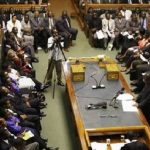To this end now, all our higher and tertiary education institutions are required to provide an education that is derived from the national need and required then to cause industrilisation through the innovation and industrialisation fund so that we dispose of the idea of looking for work and adopt the idea of creating the work that is needed to feed into the needs of our people. So Hon. Speaker, I want to submit and say the Manpower Planning and Development Amendment Act is a complete revolution in terms of what our education is expected to do. So, we expect the effect to start showing very vigorously as we move in time as a nation within very few months to a year or years to come.
Mr. Speaker, I want to finally submit that this Act conforms to the spirit of creativity in terms of science, research as well as academic freedom that is enshrined by Section 61 of the Constitution which says “if people are free to think and create that is where the development of a country comes from”. Therefore polytechnics, vocational training centres, teachers’ colleges and industrial training centres are now within the league of universities in terms of being accorded the freedom that they need to create, modernise and industrialise this country. So I want to submit that this is the operationalisation of the heritage based education 5.0 that we have been looking for. There is now a legal basis to do so.
I also want to say Hon. Speaker that this Manpower Planning and Development Amendment Act now enshrines the country to have an ecosystem of scientific institutions including academies of science that are the driver of the strategic thinking and intelligence of a nation whereby we anticipate new economies and not be befallen by new economies. Instead of adopting what they call now there is industry 4.0, Zimbabwe will start to say there will be industry 7.0 and it starts from here whereby we become participants in the knowledge creation ecosystem of this world rather than just consumers of the knowledge ecosystem.
So Hon. Speaker Sir, by this Act Parliament and His Excellency the President are saying nobody will be able to stop Zimbabwe now in terms of its development. Once a nation begins to learn to think on its own which we call mental sovereignty and do based on what it thinks nobody can stop that nation. I thank you.
HON. T. MOYO: May I applaud the Minister for the response, may be however, may he give us a timeframe in terms of import substitution industrialisation. In Zimbabwe, of late we have seen that the importation of goods into Zimbabwe, especially basic goods is on the decline. So to what extent can we expect this Manpower Planning and Development Act to substitute those imports?
HON. PROF. MURWIRA: I wish to thank Hon. T. Moyo for the supplementary question for us to be more explicit on timetables. Hon. Speaker, I want to submit that through the National Manpower Advisory Council, we did a survey and from 2014 to 2018 – this country imported goods worth US$20 billion, which means on average this country was importing US$5 billion of goods. Now, what this means is that we then need to scroll down this list and start eliminating one by one what we need to import. There are still certain things that we need to import. However, we cannot import everything.
Continued next page
(234 VIEWS)


